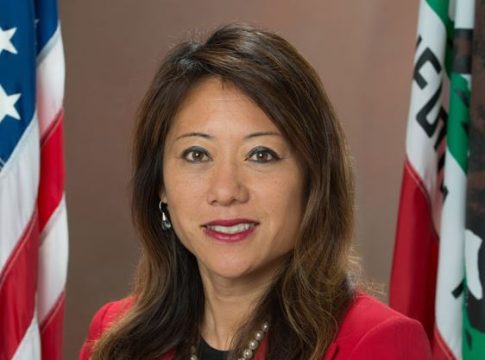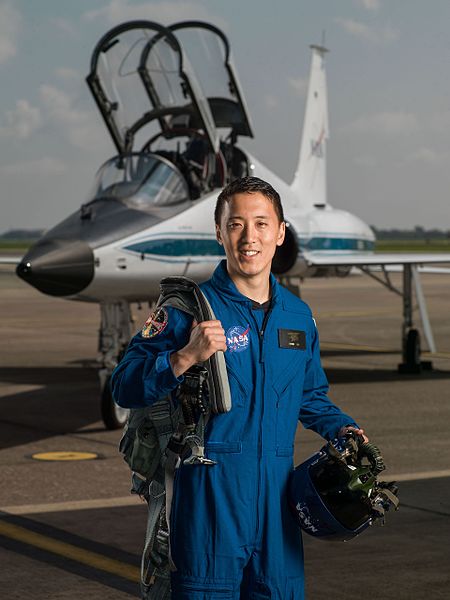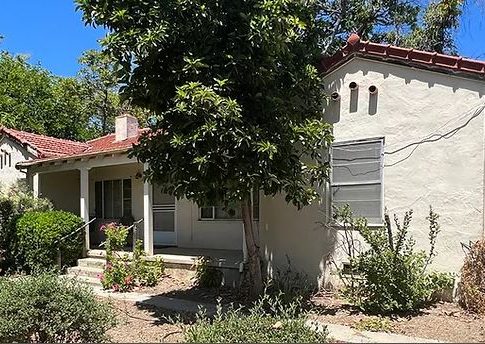
By Raymond Douglas Chong, AsAmNews Staff Writer
The husband-wife team, Baldwin Chiu, producer, and Larissa Lam, director, will debut their documentary Far East Deep South, about Chinese families in the Mississippi Delta, at the Cinequest Film and Creativity Festival at Redwood City, California, on March 7, 2020.
With its cinéma vérité style, Far East Deep South presents a very personal and unique perspective on immigration, race, and American identity. The film follows Baldwin Chiu and his father, Charles Chiu, on a surprising trip from California to Mississippi in search of their lost family history. Along the way, they meet a diverse group of local residents and historians, who shed light on the racially complex history of the early Chinese in the segregated South. Their emotional journey also leads them to discover how exclusionary immigration laws like the Chinese Exclusion Act of 1882 separated their family for generations.
Far East Deep South (2020) expands the story of Baldwin Chiu’s family search for their roots, first introduced in the award-winning documentary short film, Finding Cleveland (2015).
AsAmNews spoke to both Chiu and Lam about their journey
LATEST STORIES
Chiu reflected:
All my life, I have struggled with my identity and wrestled with whether I was American enough or Chinese enough. Recently, I encountered different people making racist comments and assumptions about me just based on how I look. After finding out the truth about how deep my roots run in this country, I now have a stronger sense of belonging and pride as an American.
When Caliya (daughter of Baldwin and Larissa) was born, I saw my father (Charles Chiu) hold her and it was the first time I saw a grandfather/grandchild relationship in my family. That made me wonder why I never saw my grandfather and that started my desire to find out.
Baldwin, Larissa Charles Chiu (Baldwin’s father), Edwin Chiu (Baldwin’s younger brother) made their fateful tip to search for their ancestral roots at Cleveland, Mississippi, on September 2014. Born in 1938, Charles Chiu (But Yue Chiu) only recalled the brief visit of Kim Chong Lou, his father at the village, when he was a toddler.
Chiu observed Cleveland as:
Small town, and very welcoming. They did not seem surprised to see a Chinese family there as I thought they would. What they WERE surprised at was that we were from California and they didn’t know why we would go there.

They found the tombstone of Charles Jue Lou, Baldwin’s great grandfather and Kim Chong Lou, Baldwin’s grandfather, at the New Cleveland Cemetery. Charles Jue Lou was the first Chinese buried at the Cemetery.
When standing in front of the Lou tombstone, Chiu shared:
That our legacy in America is a lot deeper than most Americans and that my grandfather and great grandfather had to go through so much. It was surreal to be at a location where there were now five generations at one location. My great grandfather and grandfather who shared the same tombstone buried side by side, my father, myself and my brother, and my daughter.
The Chiu forefathers came from Sunwui (Xinhui) of Kongmoon (Jiangmen) in Kwangtung (Guangdong) of Cathay (China). Charles Jue Lou was born in 1877. Kim Chong Lou was born in 1903. The Lou family owned Charles J. Lou Fancy Meats and Market on Hayden Avenue at Pace, a town northwest of Cleveland. Charles Jue Lou died in 1939, after a long period of illness. Kim Chong Lou died in 1946, due to an appendicitis.
According to Baldwin, the 1882 Chinese Exclusion Act negatively affected his Chiu (Lou) forefathers, thru 1965.
It prevented my grandmother, dad and aunt from coming to the United States to join my grandfather in Mississippi. My grandfather had a sister, my great-aunt, who was also left behind in China. The Chinese Exclusion Act made it very difficult to bring Chinese women over to the US and therefore, also difficult to bring children over. In the case of my great-aunt, grandmother and aunt, they actually never made it to the U.S. My father came in 1952 to the U.S. but he needed to have a special bill passed because the immigration policies were so restrictive until 1965.
My great grandfather Charles Jue Lou took his first trip to China in 1902 on the Nippon Maru and came back to the US in 1905. This was to basically have a family because there were no Chinese women in the US for him to marry and start a family with. But he had to come back to the US alone and left my great grandmother and grandfather in China for 15 years due to the Chinese Exclusion laws. He then went back to China after getting all the paperwork to bring his family over in 1920. He would travel in and out through San Francisco.
Kim Chong Lou arrived on the S.S. Nile in 1920 with Charles Jong Lou, his father, and Chin Shee Lau, his mother.
Charles Chiu (But Yue Chiu) arrived aboard S.S. President Cleveland in 1952, with Chiu Shee Lau, his grandmother. Charles mainly lived in Oakland, California, when he first came to the United States. He graduated from Oakland Technical High School there and then worked many jobs. He served in the United States Air Force and retired after over 20 years. He also retired from working for the State of California. His wife, Rebecca, was born and raised in Hong Kong.
At Mississippi Delta Chinese Heritage Museum, Charles Chiu was given the bible of Kim Chong Lou. Later, the Dunn family presented a letter written by him to J.W. Dunn about his life at Pace.
Chiu commented:
This gave my father, Charles, hope. It could have been any other book, but it was something that meant that as a Christian, my dad could possibly one day meet his father in heaven. The letter was from K.C. Lou to J.W. Dunn. This letter was between friends but showed that K.C. Lou did care for and love and miss his kids which was my father Charles and his sister.
The Mississippi Delta Chinese Heritage Museum was an invaluable resource, according to Chiu:
At the Mississippi Chinese were first brought over to work on plantations in Mississippi side by side with Blacks. Eventually they moved into owning grocery stores partly because they couldn’t make a living working plantations and also the 1882 Chinese Exclusion Act ended up banning new Chinese entering the country from working labor jobs. The Chinese in the early days were only allowed to be in the Black neighborhoods and could not own homes, so they ended up living in the grocery stores in the Black neighborhood.
We found the Mississippi Delta Chinese Heritage Museum on the Delta State University campus in Cleveland, MS. They connected us with the Dunn Family who ended up buying my grandfather’s store after he passed away. We met an older Italian man named John Bassie that knew my grandfather and took us to the store location. We then connected with the Black community including the Mayor of Pace, MS where my grandfather/great grandfather’s store was located. Mayor Levon Jackson told us the history of Pace, MS and that my Great grandfather Charlie Lou, was an original settler of that town along with the Pace family before it was renamed, “Pace”.
The Mississippi Delta Chinese Heritage Museum captures a lot of the history of the early Chinese in the Mississippi Delta. It shows how important their contributions to the community really were. Despite all the racial prejudices and laws against them, they still gave back to America and had a large number of Chinese that served in World War II.

Lam remarked:
I was amazed to find the Mississippi Delta Chinese Heritage Museum. That meant there was a significant enough of a Chinese population in Mississippi Delta to warrant a museum. There were so many families who contributed greatly to the community beside just Baldwin’s family. It was also a surprise to find out that the Jim Crow laws also negatively impacted the Chinese too. They could not attend White schools. They had to be buried in separate cemeteries.
Chiu related to the several significant connections at Cleveland: John Bassie; Harold Lum; and J.W. Dunn.
John Bassie’s family’s store was a few stores down from my grandfather’s store in Pace. His family is Italian, and they were also relegated to living in the Black neighborhood because back then, Italians were not considered “White” either. As a boy, he would frequently visit my family’s grocery store. John Bassie is about the same age as my father so if my father would have been able to come to the US with my grandfather, John and my dad would have been friends playing together.
Harold Lum’s family’s grocery store, Lem King, was two stores down from our family’s store in Pace.
Emerald, Jimmy, Raymond and David Dunn’s father was “J.W. Dunn”. J.W. Dunn was close friends with my grandfather KC Lou. After KC died, JW Dunn bought the store. It was because JW Dunn didn’t throw anything away, that Emerald was able to find items that pertained to my grandfather K.C. Lou.
Lam remarked:
J.W. Dunn was very sentimental and kept several scrapbooks where we found photos of Baldwin’s family members and other significant mementos that we reveal in our film.
“Finding Cleveland” was profiled on NBC News among other media outlets. We also screened the short at over 100 community engagement events across the country. We’ have also screened the film at the U.S. Department of Education among other government agencies. More importantly, several schools who have seen “Finding Cleveland,” are now including the history of the Chinese in the segregated south in their classroom lessons. Many schools are also showing the film to their students. We are hoping that we can see an even greater impact on how history is taught in schools with our new film.
In our new film (Far East Deep South), we meet one older man, Happy Imm, who spent a lot of time in Baldwin’s grandfather’s grocery store in Pace, Mississippi. He recounted so many wonderful stories but also told us about how Baldwin’s great-grandfather gave credit to his Black customers during the Great Depression. Most White banks and stores would not give credit to Black customers during this time.
Larissa describes the core message and key aspects of Far East Deep South:
We hope it expands how we think about American history and what it means to be an American. We hope that when future generations learn about the American South, they will know that there was more to the story than just Black and White.
The film presents a very personal and unique perspective on immigration, race and American identity. It is a very emotional film that is also educational. It is full of surprising revelations up until the very end of the film. In telling the story of Chinese families in the Mississippi Delta, we wanted to make sure we also heard from the African American and White communities that interacted with the Chinese. It gives more backstory as to why we had to go find “Cleveland” Mississippi in our short film and we discover even more revelations about Baldwin’s family. We really got to dive deeper into the lives of those who knew Baldwin’s family and what it was like to live in the segregated South.
Lam declares:
Most of the history we learn in school about Asians in America is limited to Chinese railroad workers or Japanese internment camps. Yet, we all learn about segregation but rarely hear about how Asians and other people of color were also impacted by Jim Crow laws. We hope our film, “Far East Deep South,” helps change how American history is told so that it paints a more accurate and inclusive picture.
Since their subliminal visit of Cleveland in September 2014, Larissa said:
We have made it our mission to help educate people about the deep history of Asians in America. We also traveled extensively speaking to students and groups about why it’s so important to not only learn about our family stories but to tell them.
AsAmNews has Asian America in its heart. We’re an all-volunteer effort of dedicated staff and interns. Check out our new Instagram account. Go to our Twitter feed and Facebook page for more content. Please consider interning, joining our staff, or submitting a story.










RE: Far East Deep South- A Poignant Story of Chinese families during segregation era of the Deep South: wonderful, thank you so much